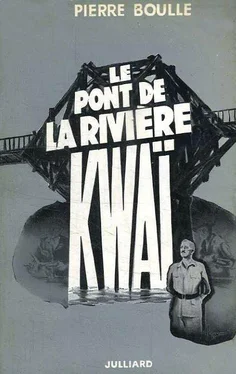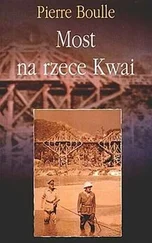“You’re right, I can see that,” Colonel Nicholson agreed, after carefully watching the men at work. “I’d already noticed the lack of organization.”
“But that’s not all, sir. These idiots have fixed a quota of a cubic yard of earth per man, without realizing that our chaps under proper supervision could do much more. Between you and me, sir, it’s a soft job. When they think each man has dug, shifted, and spread his cubic yard, they call it a day. That’s why I say they’re idiots. If there are still a few clods of earth left to be carted away so as to connect two isolated stretches, do you think they ask for an extra effort? Not a bit of it! They simply order the squad to down tools. In that case, how can I order them to carry on? What would the men think of me if I did?”
“So you think it’s a really poor show?” said Colonel Nicholson.
“It’s an absolutely rotten show, sir,” Reeves broke in. “In India, where the climate’s just as bad as this, and the ground’s much harder, the coolies get through one and a half cubic yards quite easily.”
“That’s what I thought,” the Colonel murmured. “I was once in charge of a job like this myself, building a road in Africa. My men used to work much faster than this. One thing’s quite clear,” he concluded decisively, “we can’t go on like this. You were quite right to let me know about it.”
He went through his notes again and, after a moment’s reflection, turned once more to his two officers:
“Now listen, both of you. Do you know what I think of all this? Practically the whole trouble can be traced back to one simple cause: complete lack of organization. I’m the first to blame, I know; I should have seen to it in the first place. That’s the worst of rushing things, you always waste time in the end. Organization, plain and simple— that’s what we need more than anything else.”
“You’ve said it, sir,” Hughes agreed. “A job like this is doomed to failure if it’s not properly worked out in advance.”
“I think we’d better call a conference,” said Colonel Nicholson. “I should have thought of that before. Between the Japanese and us. A discussion between both sides is what we need to determine each man’s duties and responsibilities. That’s it, a conference. IH go and have a word with Saito right away.”
The conference was held a few days later.
Saito did not understand what it was all about, but he had agreed to be present, not daring to ask for an explanation for fear of losing face by appearing ignorant of the customs of a civilization which he hated but which impressed him in spite of himself.
Colonel Nicholson had drafted an agenda, and waited with his officers in the long hut which served as a dining room. Saito arrived accompanied by his engineer, some of his bodyguard, and three captains, whom he had brought along to swell the numbers in his escort although they could not speak a word of English. The British officers stood up and snapped to attention. The Colonel gave a regimental salute. Saito looked quite startled. He had arrived with the intention of asserting his authority, and here he was, already visibly conscious of his inferiority when faced with this ritual performed with a traditional and majestic sense of propriety.
There was quite a long silence, during which Colonel Nicholson shot a glance of inquiry at the Jap commandant, whom he naturally expected to take the chair. The conference could not be held without a chairman. Out of common courtesy, the Colonel felt obliged to wait for the other to declare the meeting open. But Saito felt more ill at ease and could hardly bear the idea of being the focal point of this gathering. The manners and customs of the civilized world made him feel small. But he could not allow his subordinates to see that he was unfamiliar with them, and he was paralyzed with the fearful thought that he might be committing himself by taking the chair. The little Japanese engineer looked even less self-assured.
With a great effort he pulled himself together. In a churlish tone of voice he asked Colonel Nicholson what he had to say. This was the least compromising move he could think of making. Realizing that he would get nothing more out of him, the Colonel decided to take action and embarked on a speech which the English side, with increasing anxiety, had begun to lose hope of ever hearing. He started off with the word “Gentlemen,” declared the meeting open, and in a few words outlined his proposals: to establish a proper organization for the construction of the River Kwai bridge and to draw up in general terms a plan of action specifying each individual responsibility. Clipton, who was also present—the Colonel had asked him to attend, since the M.O. was naturally concerned with certain points of general administration—noticed that the C.O. had completely recovered his self-assurance and that his confidence asserted itself in direct proportion to Saito’s increasing embarrassment.
After a short formal preamble, the Colonel embarked on the main subject and came to the first important point.
“Before tackling any other question, Colonel Saito, we ought to discuss the position of the bridge. It was fixed, I believe, a little hastily, and we now think it ought to be changed. We have in mind a point about a mile further downstream. This, of course, would entail an extra stretch of railway line. It would also mean shifting the camp and building new quarters nearer the site. But I don’t think we should let this stop us.”
Saito gave a hoarse grant, and Clipton thought he was going to lose his temper. It was easy to imagine his frame of mind. Time was running short. More than a month had gone by with no material result being achieved, and now came this proposal for a considerable increase in the work as originally envisaged. He stood up suddenly, his hand clutching the hilt of his sword; but Colonel Nicholson gave him no opportunity of continuing this demonstration.
“Just a minute, Colonel Saito,” he said in ringing tones. “I’ve had the matter looked into by my colleague, Captain Reeves, an engineer officer who is one of our bridge-building experts. The conclusions he has reached…”
Two days before, after carefully watching the Japanese engineer at work, he had been finally convinced of his inefficiency. He had at once taken a definite decision. He had seized his technical adviser by the arm and exclaimed:
“Listen, Reeves. We’ll never get anywhere with this bungler, who knows even less about bridges than I do. You’re an engineer, aren’t you? Well, you’re going to take charge of the whole works and start off again right from the beginning, without bothering about what he says or does. First of all, find a proper position for it. Then we’ll see…”
Reeves, delighted to be engaged once more on his prewar occupation, had carefully studied the ground and sounded the depth of the river at various points. He had discovered an almost perfect bottom of hard sand which was quite capable of bearing the weight of a bridge.
Before Saito could find the right words to express his indignation, the Colonel had called on Reeves, who proceeded to state a few technical principles, and then quoted certain pressure-and-soil-resistance figures in tons per square inch which proved that the bridge would collapse under the weight of the trains if they insisted on building it over a swamp. When he had finished, the Colonel thanked him on behalf of all present and concluded:
“It seems quite clear, Colonel Saito, that we ought to shift the position of the bridge if we want to avoid disaster. May I ask your colleague for his advice on the matter?”
Saito swallowed his rage, sat down again, and embarked on a heated discussion with his engineer. The Japanese had not been able to send their best technicians to Siam since they were needed for the war effort in the capital. This one, then, was not up to the mark. He was obviously lacking in experience, self-confidence, and ability to command. He blushed when Colonel Nicholson drew his attention to Reeves’s calculations, made a pretense of carefully studying them, and finally, too nervous to be able to check them, and in a state of complete confusion, pathetically admitted that his colleague was right and that he himself had come to the same conclusions several days ago. It was such a shameful loss of face on the part of the Japanese that Saito went quite pale and drops of sweat broke out all over his contorted brow. He made a vague gesture of assent. The Colonel went on:
Читать дальше











